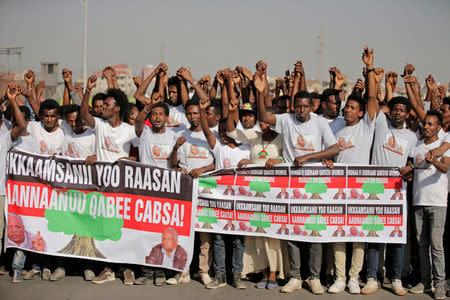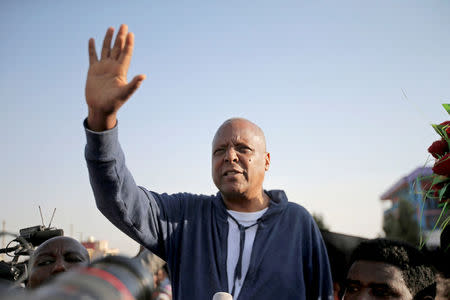U.N. seeks release of more Ethiopian 'political detainees', reforms
GENEVA (Reuters) - The United Nations on Friday welcomed Ethiopia freeing 115 detainees, including a senior opposition leader, this week, but called for it to review the status of thousands still jailed and to loosen anti-terror laws and curbs on activists and media.
Ethiopia freed a senior opposition leader, Merera Gudina, leader of the Oromo Federalist Congress party, on Wednesday, advancing efforts to calm political turmoil following violence and mass protests that shook the country in 2015 and 2016. He was arrested in late 2015 and charged with collusion with groups outlawed by the Addis Ababa government.
The ruling coalition has indicated that cases against some 400 other detainees held at the regional level are being discontinued, U.N. human rights spokesman Liz Throssell told a news briefing.
"These are positive developments. We urge the government to continue to take steps to release individuals detained for expressing their political views," Throssell said.
The opposition leader's release coincides with mounting concerns over the long-term stability of one of the fastest growing economies in the region.
"We do think that Ethiopia is at a key moment and that's why we are saying that we stand ready to help Ethiopia," Throssell said.
Hundreds were killed during two years of violence triggered by allegations of land grabs in Ethiopia's central Oromiya province, with protests then broadening into demonstrations over political restrictions and perceived rights abuses.
"We don't have an exact figure on the number of people that have been in detention. We do think that it is in the thousands," Throssell said, adding they included "political detainees".
"We have reports that during the unrest and the state of emergency, more than 20,000 people were detained. Some of those were subsequently released, but we do believe that there are still a high number of people in detention," she said.
Throssell urged the Ethiopian government to review anti-terror legislation and laws "to ensure that they are neither interpreted nor implemented too broadly, thereby resulting in people being arbitrarily or wrongfully detained," she said.
Laws placing "undue restrictions" on non-governmental organisations and restricting the media should also be revised.
(Reporting by Stephanie Nebehay; Editing by Toby Chopra)

 Yahoo News
Yahoo News 

